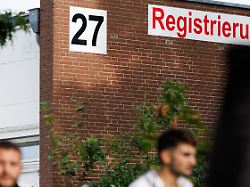Refugee talk near Illner
“We need humanity and order”
By Marko Schlichting
October 6, 2023, 5:36 a.m
Listen to article
This audio version was artificially generated. More info | Send feedback
On Wednesday, the EU states agreed on important points to combat the refugee crisis. However, these will not solve the problems in the short term. In the evening on the ZDF talk show Maybrit Illner, the guests discussed possible quick solutions.
It’s nothing new: the number of refugees in Germany is too high. Apparently Germany is too attractive for asylum seekers. At least that’s what almost all of the guests on the ZDF talk show Maybrit Illner think in the evening. It was only on Wednesday that the 27 EU states agreed on a crisis regulation. Among other things, this stipulates that migrants from countries that are considered particularly safe will be accommodated in particularly secure reception facilities under prison-like conditions after crossing the border. An asylum application should be examined there within about three months. Countries that are heavily burdened, such as Italy and Greece, are to receive some of the asylum seekers in the future, and countries that do not accept refugees are to be forced to make compensation payments.
The EU states have reached an agreement, but this is not yet a set of rules, says Thorsten Frei from the CDU. This requires the participation of the European Parliament. The parliamentary managing director of the Union faction assumes that parts of the crisis regulation will be changed there. And: “If you look at it closely, you’ll see: This will only take effect in two or three years. That means in plain language: national measures will still be necessary,” said Frei.
Green Party co-leader Omid Nouripour praises the agreement, which comes into effect in the event of a crisis and which has been improved by the federal government’s proposals: “It is no longer the case that when a state declares a crisis, all standards are suspended.” And further: “We need humanity and order. The situation at the EU’s external borders shows neither one nor the other.” However, his party is divided over the crisis regulation. “The discussion has the power to put the Greens under high tension,” says journalist Anja Maier from “Zeit”. “The Greens are having their party conference in November. I’m looking forward to it.”
“We are not losing control”
Ulf Kampfer deserves his name. The mayor of Kiel is struggling with the high number of refugees locally. “Now things are starting to get difficult,” he says at Maybrit Illner. “We haven’t lost control yet. But we have the situation where I know that forty new refugees are arriving every week and we only have 150 places left. Actually, we’re full now.” The only way he knows how to help himself is to “compact” himself in the large accommodations. In concrete terms, this means: “There is a family with two children, I may still have them in a six-bed room. They now have to downsize because I need the six beds for others.” That’s not worthy of integration, that’s not good, says Kampf.
The agreement in Brussels cannot help him, and it would come too late anyway, says migration researcher Ruud Koopmans from the Humboldt University in Berlin. He is calling for an offensive in negotiations with third countries and is once again in favor of accommodating refugees not only in North Africa but also in European countries such as Albania while their asylum applications are being examined.
“The most attractive offer for migrants”
In order to reduce the number of refugees coming to Germany, the stay should become less attractive. This is what the Union wants to achieve – and with it an adaptation to European standards. In fact, social benefits are not as advantageous in any country in the EU as they are here. This is regulated by the Asylum Seekers Benefits Act. After 18 months, asylum seekers are entitled to “extended benefits”, just like those who receive citizens’ benefit. This is too early for CDU leader Friedrich Merz. He wants this regulation to only take effect after three years, says Thorsten Frei at Maybrit Illner. Even that would be more humane than the regulations for rejected asylum seekers in other EU countries. In France or Denmark there is no money for rejected asylum seekers, in Greece there is accommodation and food – until they leave the country.
“Germany has the most attractive offer for migrants,” says migration researcher Koopmans. And Nouripour demands: “It is absolutely necessary to look at what people live on.” He wants work opportunities for rejected asylum seekers to be made easier. Thorsten Frei advocates that rejected asylum seekers no longer receive any money and should instead buy groceries using chip cards. This is already possible, explains Kampf, but is not being implemented in municipalities due to the high level of bureaucracy involved. Journalist Anja Maier is also skeptical: “A country that didn’t even get its health departments digitized during the Corona crisis now suddenly wants to issue chip cards to people,” she scoffs.
One thing is important for the mayor of Kiel: “That I need a plannable, controlled and reliable migration. We want to fulfill our humanitarian obligations. We want to integrate the people. And we could do that if we distributed the refugees well across Europe.”
